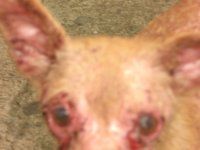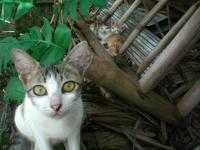Source: www.pet-grub.com
If you wish to quickly print this entire book with the greatest of ease, please read the following page:
The Vigilante Guardian
Sponsored Links
This is the article that got me in the public's eye. Originally published in September 1994 in Shared Vision, a local holistic magazine that is now known as
Today's Vancouver Woman. The response to my article was phenomal.
Many pet owners are beginning to question the validity of conventional methods used by veterinarians and are concerned about the health of their dog or cat.
Processed foods and drugs have seriously depleted the natural vitality and immune systems of many pets. Though natural health care for animals has been virtually non–existent in the past, it is rapidly growing in popularity as a cheaper, more effective alternative.
Sad to say, it is often though who care most for their pets who, through ignorance, can do them the most harm. By closely identifying with their dog or cat, pet owners tend to imagine that what is good for them will also be good for their animal. However, this is not always the case.
Dogs and cats are anatomically very different to humans. Their intestinal tract, for example, is only half as long as a human's, and food is therefore processed and assimilated very differently.
Whereas large amounts of raw meats can cause problems in humans, a lack of raw meat in an animal's diet can lead to serious health problems.
Animals require the enzymes, the amino acids and other nutrients in the raw meat in order to stay healthy.
Many skin and coat problems are a direct result of a lack of raw animal fat in the diet — fat which humans often believe is bad for their pets.
Animals need at least 30% raw fat and their systems are not designed to handle cooked meat. In the wild, a panther or jackal doesn't barbecue, grill or smoke the meat of its prey... and it definitely doesn't walk to the local supermarket to buy dry food. Yet most pet owners recoil at the thought of feeding raw meat to their dog or cat, concerned about bacteria and parasites.
Healthy dogs and cats however, don't get salmonella poisoning because their digestive system is so acidic (or should be) that it kills everything. This is why a dog can bury a bone and dig it up two weeks later and eat the rotting meat. Humans on the other paw, can pick up parasites more easily because their digestive tract is nowhere near as acidic as that of a carnivore.
The meat contained in canned pet food is cooked, devoid of nutrients and usually contains many harmful preservatives, colourings, and additives.
Dry, processed food also lacks the teeth cleaning properties of fresh raw meat. I always ask, if dry food cleans teeth so well, then why do the very pets eating dry food have such a high case of dirty and bad teeth?
Without the natural cleansing action of the raw meat on the teeth, unhealthy bacteria builds in the mouth causing infection, foul smelling breath and tooth decay.
The high salt content in some processed foods can cause animals to become unnaturally highly strung and nervous. In addition, the high salt content can burn the stomach and intestinal tract making the pet want to drink water until it vomits the food it just ate.
To begin the return of health to our pets, one needs to begin the journey of feeding wholesome pet foods. Pets require a wholesome diet which strengthens the immune system and they need a diet that closely resembles a diet which they would get in the wild.
The best type of food to feed your pet is food you make yourself. Homemade food is the most wholesome of all food choices available. It's just common sense.
Most commercial pet foods claim to be 100% complete, but I ask you, complete for what?
The nutritional requirements of one pet can be slightly or dramatically different to that of another pet.
By providing maximum nutrition through the use of wholesome homemade food, you allow your pet's body to decide what nutrition it needs or doesn't need. Your pet's body will choose and pick what it needs when given the opportunity. But how can highly processed food do this?
The idea that a commercial pet food is 100% complete is really absurd, but it's the absurdity that sells it.
There are two major flaws to this idea of being 100% complete.
-
Being 100% complete means the commercial pet food only meets 100% of the minimum nutritional requirements.
-
The commercial pet food may contain nutrients, but how much of this nutrition is absorbed? I always say that cement is high in minerals, but you don't see me eating it!
With wholesome pet food, you begin to provide the body with maximum nutrition. In addition, wholesome homemade pet food is more digestible meaning your pet can get more nutrition from the food it eats.
Furthermore, most commercially prepared pet foods contain preservatives such as BHT, BHA, MSG, etc, which can cause birth defects, liver and kidney problems, baldness, brain defects and more. In addition, these preservatives and additives may be carcinogenic (cancer causing).
The high salt content of many brands of pet food can cause high blood pressure and heart disease in our pets.
Semi–moist pet foods usually contain sugar or propylene glycol (a chemical used in anti–freeze and is found at many airports near the runways). These additives are linked to obesity, allergies, tooth decay and other problems. Propylene glycol is often used in shampoos and even in many of your favourite store bought salad dressings... read the label! I am always dumbfounded how a chemical used in anti–freeze can also be used in salad dressing... but I guess if living in a cold climate, you won't have to worry about freezing then.
A relatively new ingredient in pet foods is ethoxyquin which has been implicated with thyroid problems, hair loss and reproductive disorders. A component of ethoxyquin is quinoline which is regarded as the ultimate carcinogen.
Ethoxyquin was originally created by Monsanto as a rubber hardener and has also been used as a pesticide on pear and apple trees. It took a congressional act, thanks to the lobbying of Monsanto, to take ethoxyquin off the toxic substance list so it is safe
.
Homemade pet food is not only free of such harmful additives, but has the added benefit of containing natural remedies for common ailments.
The acidity of raw meat destroys the mucous in which worms live. Since these parasites cannot survive in a healthy, mucous free system, homemade pet food has the added advantage of increasing the animal's vitality and reducing the vet bills for the owner.
How you care for your pet's coat can be just as important as the diet. Any shampoo that is intended for external use only or is meant to kills fleas, should be avoided. If the label reads domestic
and has a guarantee
on the label, then it means it is a pesticide for home use and it is therefore a poison.
These shampoos are absorbed through the skin and into the body. The result can be liver and kidney damage, a weakened immune system and ultimately, it won't even kill the fleas. Only a strong immune system will keep your pet flea free.
Fleas, like many other parasites, build resistance to insecticide shampooing. Hence, the application of such products can only be harmful to your pets.
Natural alternatives include Tea Tree oil (Malaleuca alternifolia) shampoos and products; eucalyptus, cintronella and pennyroyal. However, although these are natural, they may be a bit overwhelming to an animal's sense of smell (a dog and cat's sense of smell is 1000 times more powerful than our own).
Adding aloe vera juice to a quality herbal shampoo can be a more soothing and more effective choice.
Providing natural healthcare for your pets brings numerous benefits to both pets and owners alike.
Those who feel they do not have the time to prepare homemade food for their pets might be surprised to know that a four day's supply of food can prepared in as little as 10 minutes.
Cats, Lots of Cats
After my article, The Vigilante Guardian
was published, I met quite a few people — one of whom was Karen Brewster and oh yes, her cats too.
 Meet Jumbo, the participant in
Meet Jumbo, the participant in 